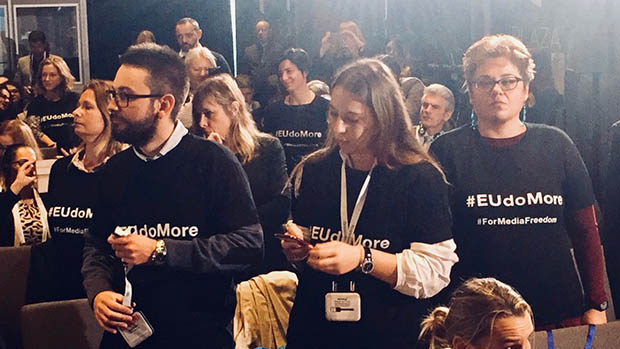
BELGRADE, 14.11.2017. – Members of ‘For Media Freedom’ – an informal group comprising journalists, editors and activists – are to meet Serbia’s Prime Minister on Tuesday to discuss what they say is the free media’s worsening plight.
Members of the “For Media Freedom” organisation were due on Tuesday to meet Serbian Prime Minister Ana Brnabic and submit a list of requests and complaints about what they call the worsening situation of the free media sector in the country.
The editor of the local newspaper Vranjske, Vukasin Obradovic, said it would be the first time that the umbrella for 26 media associations and NGOs had sat down with Brnabic – and the focus of their talks would be the status, rights and conditions of journalists in Serbia.
“We will present our requests to improve the status of the media in Serbia and the things the government could do in those terms,” he told N1 television on Sunday.
Obradovic, a former head of the Independent Association of Journalists of Serbia, NUNS, added that the “For Media Freedom” group did not intend to enter into any political discussions and wanted only to concentrate on the conditions of journalists.
Criticising the EU for its non-involvement in the problems facing the media in Serbia, he said the EU should not be “hypocritical and observe the state of media freedom in Serbia using different lenses in relation to the standards applied in the EU”.
Representatives of “For Media Freedom” group who participated in the EU-Western Balkans Media Days, held in Tirana last week, staged a brief protest during that event by standing in black shirts with the message #EUdoMore.
Serbian journalist Tamara Skrozza said in her speech during the event on November 10 that “the EU should not be fighting our battles, but also not complicate our efforts to fight for the freedom of the media in Serbia”.
Many journalists feel under attack in the country if and when they speak out.
On September 18, the party of Defence Minister Aleksandar Vulin, which is part of the government, called the editor of the Serbia’s Crime and Corruption Reporting Network, KRIK, Stevan Dojcinovic, a “drug addict”.
The verbal attack was in apparent retaliation for his published investigation into the minister’s real estate puchases.
Soon after, Obradovic went on hunger strike in protest over the closure of his title and what he called the decline in media freedom in Serbia.
In earlier incident, the apartment of Dragana Peco, a journalist with the KRIK network, was broken into on July 8, while she was out.
The Interior Minister, Nebojsa Stefanovic, promised that the case would soon be solved. Months on, those responsible for the incident have not been found.
Journalists also complained of being attacked on the day in June when new President Aleksandar Vucic was sworn in.
Several incidents, including assaults on journalists, marred the occasion. The perpetrators of these assaults were not arrested, however, even after the media published their photos.
A progress report published by the European Commission in November 2016 noted that Serbia had made no real progress, and had only carried out “some level of preparation”, in terms of supporting freedom of expression.
The watchdog rights organisation Freedom House, in its last report, said that Prime Minister, now President, Aleksandar Vucic – and media outlets aligned with him – had pursued a drive to portray all investigative and critical media organizations as foreign-backed propagandists seeking to damage the government and destabilize the country.
“Self-censorship was a worsening phenomenon that journalists attributed to concerns about both harassment and economic pressure,” the report for 2015, published last year, said.
The UN Human Rights Committee expressed in March its concern about Serbian officials publicly vilifying and intimidating media professionals, and about the prosecution of journalists and civil society actors merely for expressing their opinions.